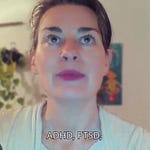ADHD, burnout, brain injury, and PTSD share several overlapping cognitive, emotional, and neurological traits, making them easy to confuse or coexist in one person. Here are some key commonalities:
Executive Dysfunction – All four conditions can impact planning, organization, impulse control, and decision-making. ADHD inherently involves executive function deficits, while burnout, brain injury, and PTSD can impair these abilities due to stress, trauma, or physical brain damage.
Memory Issues – Working memory struggles are common, leading to forgetfulness, trouble recalling details, and difficulty following through on tasks. ADHD affects working memory naturally, while PTSD and brain injuries disrupt memory storage and retrieval. Burnout can also cause "brain fog" that mimics these effects.
Emotional Dysregulation – Intense emotions, mood swings, and difficulty managing frustration, anxiety, or sadness are present in all four. ADHD makes emotional regulation harder, PTSD involves heightened fight-or-flight responses, brain injuries can alter mood control, and burnout leads to emotional exhaustion.
Fatigue & Mental Exhaustion – Chronic fatigue is a hallmark of burnout but is also seen in ADHD (due to mental overload), PTSD (due to hypervigilance), and brain injury (due to neurological damage). This can lead to low motivation and difficulty initiating tasks.
Sensory Sensitivities & Overstimulation – Many people with ADHD experience sensory overwhelm, which is also common in PTSD due to hyperarousal. Brain injuries can make the brain more sensitive to light, noise, or stimuli, and burnout makes people more irritable and reactive.
Sleep Disruptions – Poor sleep quality, insomnia, or irregular sleep patterns occur across all four conditions, affecting focus, emotional resilience, and energy levels. PTSD can cause nightmares and hypervigilance, ADHD disrupts circadian rhythms, burnout leads to stress-related insomnia, and brain injuries can damage sleep-regulating areas.
Difficulty with Focus & Motivation – ADHD is defined by fluctuating attention, but PTSD, brain injuries, and burnout can also cause concentration difficulties. PTSD sufferers may struggle due to intrusive thoughts, brain injury can impair cognitive processing, and burnout can create mental exhaustion that mimics ADHD inattentiveness.
These overlaps can make it challenging to get the right diagnosis, especially for women who have long been misdiagnosed with anxiety or depression instead. Have you ever felt like one of these conditions was mistaken for ADHD or vice versa?
Since ADHD, burnout, brain injury, and PTSD share so many overlapping struggles, here are three tips that can help with all four:
1. Reduce Cognitive Load
? Why it helps: Executive dysfunction, mental fatigue, and overstimulation make it harder to process information and make decisions.
? How to do it: Use checklists, routines, and external reminders (planners, sticky notes, apps) to offload mental effort. Break tasks into smaller steps, and limit decision-making by automating choices (e.g., meal prepping or wearing a "uniform" style outfit).
2. Regulate Your Nervous System
? Why it helps: All four conditions involve nervous system dysregulation, leading to stress, overwhelm, and emotional swings.
? How to do it: Try box breathing (inhale 4 sec, hold 4 sec, exhale 4 sec, hold 4 sec), engage in gentle movement (yoga, stretching, walking), or use weighted blankets for sensory grounding. Regular sensory breaks can prevent overstimulation.
3. Prioritize Rest & Recovery (Guilt-Free!)
? Why it helps: Fatigue and sleep issues worsen symptoms across all four conditions, making everything harder.
? How to do it: Schedule "white space" in your day—quiet time without screens or demands. Practice non-sleep deep rest (NSDR) techniques like guided meditation or body scans. Set boundaries around work and social obligations to avoid burnout.
by
Carlita Shaw
Follow me in Substack
Follow me in Wordpress
Follow me in X
Follow me in Telegram
Follow me in IG where I share more tips.
Follow me in FB














Share this post